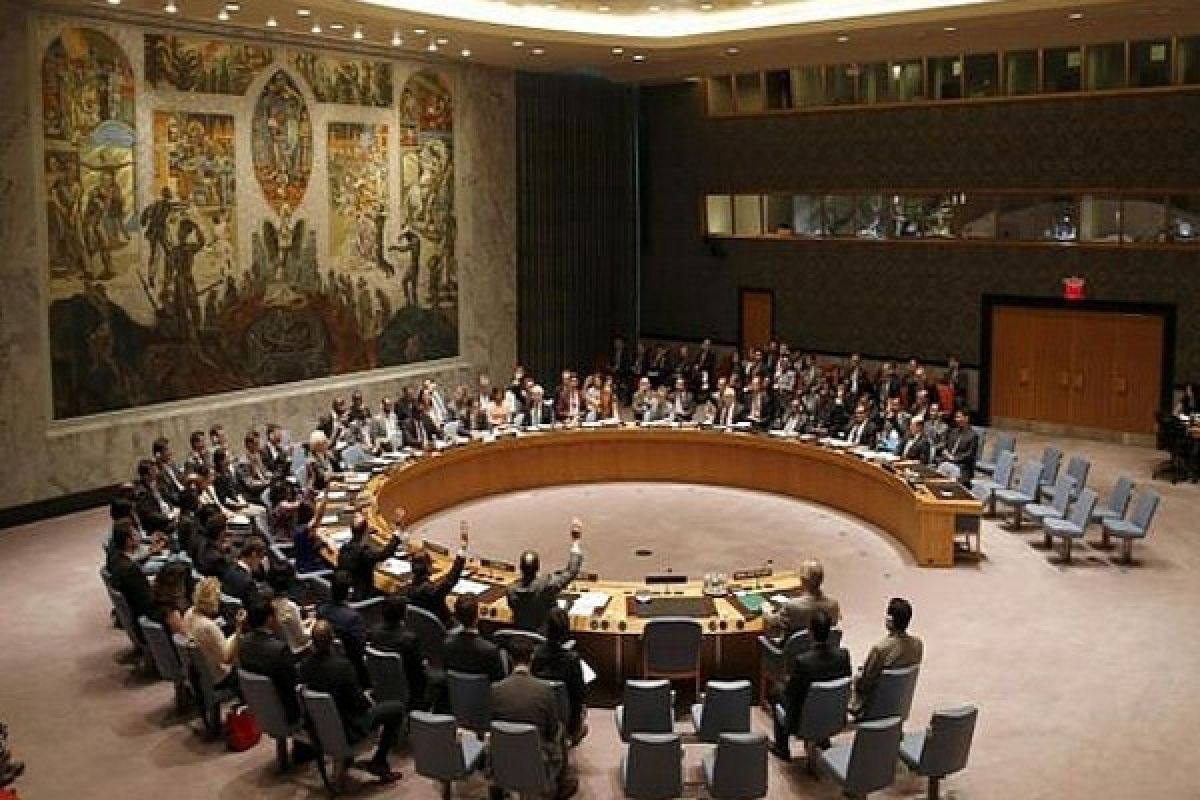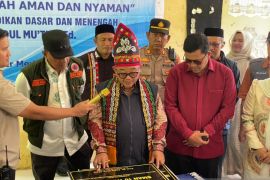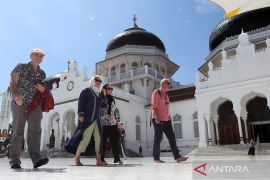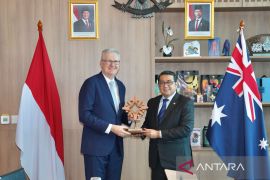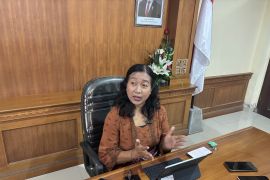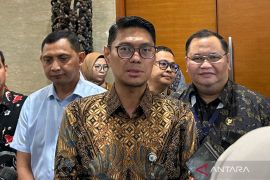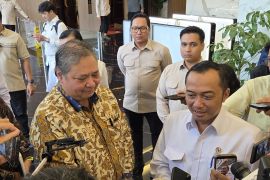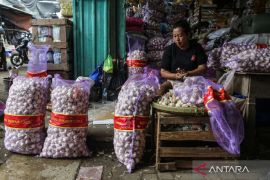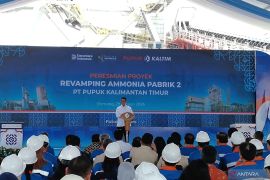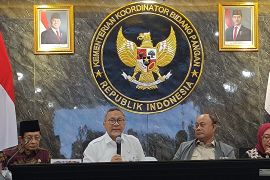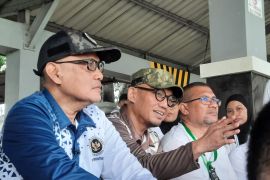According to Kalla, Indonesia would have a strategic position to be more active in the global policy-making process, if elected as the Council member.Jakarta (ANTARA News) - A year after completing the duties as a non-permanent member of the United Nations Security Council (UNSC) in 2009, Indonesia has conveyed its intention to re-run for the same position for the 2019-2020 period.
Becoming a non-permanent member of the UNSC is mandated by the 1945 Constitution, which is to participate in creating world peace.
Such a constitutional mandate was affirmed by Vice President Jusuf Kalla while attending the UN General Assembly in New York in September 2017.
According to Kalla, Indonesia would have a strategic position to be more active in the global policy-making process, if elected as the Council member.
"Indonesia will have the opportunity to provide insights and inputs in determining policies related to global issues," Kalla noted.
Indonesia has demonstrated concrete contribution by maintaining world peace by assigning thousands of personnel to assist in the UN peacekeeping operations.
The country has sent at least 2,800 troops that have been deployed in nine conflicted countries. With that number, Indonesia is among the top 10 countries providing its personnel to the UN peacekeeping force.
As part of its UNSC campaign, Indonesia has pledged to send four thousand peacekeeping troops to overseas UN missions by 2019.
In order to ease the way as a Council member, Foreign Minister Retno L. P. Marsudi has been actively seeking support from other countries as well. She has spoken with at least 120 country representatives on the candidacy.
President Joko Widodo sent three special envoys, including senior diplomat Hassan Wirajuda, Muhammad Lutfi, and Mahendra Siregar, to the event to gather support from particularly the African, Pacific, and European countries to further safeguard Indonesia`s position as a non-permanent member of the UNSC.
Issue Mapping
In addition to undertaking procedural efforts, the Indonesian government has outlined various issues before entering the Council.
One of the issues concerns non-traditional security that focuses on human security and necessitates the involvement of players from various sectors to seek solutions.
The issue of non-traditional security has been discussed at various international fora including the UNSC, which in 2007 for the first time discussed issues related to energy, climate change, and security.
Former UN Secretary-General Ban Ki Moon, in his speech in 2011, specifically demanded the UNSC to discuss issues of climate change, pandemic diseases, and transnational crimes that have a major impact on world security.
Although traditional issues, such as conventional warfare, nuclear war, and border disputes, remain major challenges in international security, non-traditional issues have potential to be discussed again at various UNSC meetings.
"Especially the new US administration that has withdrawn from its climate change commitments, which will certainly have an impact on the efforts to secure non-traditional issues," Foreign Affairs Ministry`s Head of Policy Analysis and Development Agency Siswo Pramono remarked.
Since the start of this year, the ministry`s Center for Multilateral Policy Assessment and Policy Development, in cooperation with Parahyangan Center for International Studies, has conducted joint research to help prepare Indonesia`s position on non-traditional security issues.
The research found eight thematic issues: transnational organized crimes, cybercrime, climate change, refugees, disasters, diseases, gender, and energy.
The eight issues compiled in the mid-term report titled "Suggested Indonesia`s Position and Strategy on Non-Traditional Security Issues Discussed in the UN Security Council" were collected based on the research of official government documents, legislation, UNSC resolutions, presidential statements, and press statements on non-traditional security issues.
Although the initiative to conduct the research is considered as positive and important, the government, however, needs to carefully pick the issue that will be the pre-text for further discussions among only 15 UNSC members holding the power to decide on the resolution.
Foreign Ministry`s Director General for Multilateral Cooperation Febrian Ruddyard pointed out that a careful step is essential for Indonesia in raising a specific issue based on the considerations of short period of a non-permanent member that lasts for only two years and links to the issues or situations that may harm the country`s interests.
"The filter is actually simple, if the issue involves something that poses a threat to global peace and security and there in no UN agency present that specifically handles it, then the issue is entitled to the UNSC," he noted.
During the campaign for its candidacy, Indonesia has made suggestions in three priority areas: ensuring global peace and security, ensuring synergy between sustainable peace and development agenda, as well as combating extremism, radicalism, and terrorism.
According to Ruddyard, the three issues hold relevance to the current global developments.
Optimistic
With all preparations, Indonesia has conveyed its optimism to be selected as a non-permanent member of the UNSC.
"If we lose, then it will be a serious question for our diplomatic machinery, in terms of achievement, capability, and credibility", Ruddyard emphasized.
In a secret ballot for the election of the UNSC non-permanent member to take place on June 8, Indonesia will compete with Maldives. Indonesia must garner votes from at least 129 countries to be elected.
Ana Gomes, European Parliament member, who is a guest of honor at the diplomatic reception organized by the Indonesian Embassy in Brussels to commemorate the 72nd anniversary of the Republic of Indonesia in September 2017, stated that Indonesia deserves the position.
Similarly, Head of the Belgian Minister of Foreign Affairs Ambassador Roxanne de Bilderling emphasized that Indonesia is a country, with huge economic potential, and is an important partner of Belgium in various fields of cooperation.
"Indonesia is a top-tier player in Asia and is an important regional facilitator in creating stability in the ASEAN region," Roxanne noted.
The UNSC comprises 15 countries, of which the United States, Britain, Russia, China, and France are the five permanent members, while 10 non-permanent members are elected for each two-year period.
Optimal efforts and international support are expected to ensure Indonesia`s membership in the Council for the fourth time, after it held the position thrice in the 1973-1974, 1995-1996, and 2007-2008 periods.
EDITED BY INE
(T.Y013/B/KR-BSR/O001)
Reporter: Yashinta Difa Pramudyani
Editor: Heru Purwanto
Copyright © ANTARA 2018
